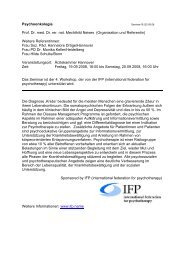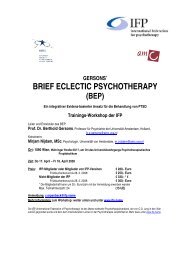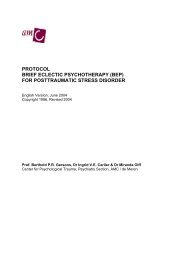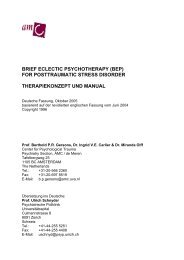'BRIEF ECLECTIC PSYCHOTHERAPY - IFP
'BRIEF ECLECTIC PSYCHOTHERAPY - IFP
'BRIEF ECLECTIC PSYCHOTHERAPY - IFP
Create successful ePaper yourself
Turn your PDF publications into a flip-book with our unique Google optimized e-Paper software.
3 rd <strong>IFP</strong>-Training-Workshop:<br />
‘BRIEF <strong>ECLECTIC</strong> <strong>PSYCHOTHERAPY</strong><br />
AN INTEGRATED EVIDENCE-BASED APPROACH FOR THE TREATMENT OF PTSD.’<br />
Friday 12 October – Sunday 14 October 2007, <strong>IFP</strong>, Vienna, Austria<br />
Workshop trainers:<br />
Prof.dr. Berthold Gersons, professor of Psychiatry, Dep. of Psychiatry, AMC de<br />
Meren, University of Amsterdam, Netherlands, b.p.gersons@amc.uva.nl<br />
Mirjam Nijdam, MSc, psychologist / researcher, Center for Psychological Trauma,<br />
Dep. of Psychiatry, AMC de Meren, University of Amsterdam,<br />
Netherlands, m.j.nijdam@amc.uva.nl<br />
Place: Vienna 13, Kardinal König Haus, Kardinal König Platz 3 (Lainzerstr.)<br />
Time: Fri 12. Oktober (14.00) – Sun 14. Oktober 2007 (13.00)<br />
Price: <strong>IFP</strong>-members or members of <strong>IFP</strong>-societies 280,- Euro<br />
Booking before Aug. 31 st : 250,- Euro<br />
Non-members of <strong>IFP</strong><br />
330,- Euro*<br />
Booking before Aug. 31 st : 300,- Eruo<br />
* Membershipfee per year 30,- Euro (15 UE)<br />
The seminar will be held in German language.<br />
Application: c.erpenbeck@ifp.name<br />
Workshop objective:<br />
‣ To understand the framework of this effective treatment for PTSD;<br />
‣ To understand and become familiarized with the different modules of this treatmentprotocol;<br />
‣ To reach level I certificate to start practicing BEP with supervision;<br />
What is BEP?<br />
The 16-sessions Brief Eclectic Protocol (BEP) was originally developed for police officers (n-<br />
300) with PTSD and proved to be effective in a randomized controlled trial (RCT). A recent<br />
RCT has shown again its effectiveness with neuro-imaging and a significant decrease of the<br />
heart rate. Meanwhile BEP has been used with excellent results for a range of other PTSD<br />
patients e.g. following disasters (n-1300). The treatment starts with psychoeducation on<br />
PTSD. The patient and his or her partner learn to understand the symptoms of PTSD as<br />
dysfunctional, and caused by the traumatic event. The patient will then receive 4-6 sessions<br />
of relaxation and imaginal exposure, focused on the suppressed intense emotions of sorrow.<br />
1
Memorabilia is used to stimulate remembrances of the traumatic event and a writing task to<br />
write a letter to someone or an institution blamed for the traumatic incident. The letter is<br />
specifically used to help to express the aggressive feelings. Most symptoms will then<br />
disappear and the patient is able to concentrate on what the impact of the trauma has been<br />
on his view of him or herself and on their world. During BEP there should be considerable<br />
change and a new equilibrium should be reached. This is called the ‘domain of meaning<br />
phase’.<br />
Recent research by Edna Foa, has shown the need of context after exposure to prevent new<br />
episodes of PTSD. The treatment will end by a farewell ritual with the partner in which the<br />
letter and or mementos are burned to leave the traumatic incident behind, as a way to turn<br />
and face life and the future, at the same time never to forget, but not hindering the<br />
individual anymore in their daily life.<br />
The workshop will cover 2,5 days in which all elements of the protocol will be trained.<br />
Schedule:<br />
Friday 12 October, 14.00 – 19.00:<br />
Afternoon:<br />
‣ Learning to know each other and presentation of expectations<br />
‣ Diagnostics of PTSD.<br />
‣ BEP- Introduction.<br />
Evening:<br />
‣ Psychoeducation.<br />
‣ Imaginary exposure.<br />
Saturday 13 October, 9.00 – 17.00:<br />
Morning:<br />
‣ Discussion of cases;<br />
‣ Use of memorabilia and letter writing;<br />
Afternoon:<br />
‣ Domain of meaning<br />
‣ Farewell ritual.<br />
Sunday 14 October, 9.00 – 13.00:<br />
‣ Indications and contra-indications;<br />
‣ Comorbidity;<br />
‣ Transference and countertransference;<br />
‣ BEP and CBT and EMDR;<br />
‣ Evaluation and diplomas;<br />
2
Short biographical sketch.<br />
CV professor dr. Berthold Gersons<br />
Berthold Gersons (61) is a psychiatrist, distinguished AMC-professor and professor of<br />
psychiatry at the Academical Medical Center of the University of Amsterdam, the<br />
Netherlands. In 1980 he started research on trauma and PTSD in the police force and he<br />
established the first self-help-team in Dutch police force. Currently 10% of the Dutch police<br />
officers are member of the ‘occupational support teams’ after trauma. He developed the Brief<br />
Eclectic Psychotherapy (BEP) protocol consisting of 16-sessions for police officers and other<br />
trauma-I victims and showed the effectiveness in randomised trials. BEP has been<br />
recognized in the NICE Guidelines (2005). He has been advisor for the Dutch Government<br />
after major disasters in the Netherlands, like the El Al air crash in 1992 and the Enschede<br />
firework disaster in 2000. He is a member of the Board of the Dutch Veterans Institute and<br />
was an advisor for the Ministry of Defence. His group with dr. Miranda Olff is active in<br />
research on treatment and biological factors. He has been member of the board of the<br />
Journal of Traumatic Stress, of the Board of the ISTSS and ESTSS. Currently he is president<br />
of the European Society of Traumatic Stress Studies. He has published over 200 papers in<br />
scientific journals and books and has lectured around 500 in his home country and in various<br />
countries all over the world.<br />
CV Mirjam Nijdam, MSc<br />
Mirjam Nijdam is a psychologist at the Center for Psychological Trauma at the Department of<br />
Psychiatry of the Academic Medical Center at the University of Amsterdam, the Netherlands.<br />
After obtaining her Master’s Degree in Clinical Psychology, she specialized in the diagnostic<br />
assessment and treatment of trauma and posttraumatic stress disorder. Her PhD project is a<br />
randomized controlled trial that compares the efficacy of two psychotherapies for<br />
posttraumatic stress disorder; Brief Eclectic Psychotherapy (BEP) and Eye Movement<br />
Desensitization and Reprocessing Therapy (EMDR). She has been teaching in education<br />
programs for students of medicine and psychology, and has been a supervisor for<br />
psychology students in their internship. Other interests include the neuropsychology of<br />
posttraumatic stress disorder and the psychology of terrorism.<br />
Reference:<br />
Gersons, B.P.R., Patterns of posttraumatic stress disorder among police officers following shooting<br />
incidents; the two-dimensional model and some treatment implications. J. of Traumatic Stress 2:3,<br />
247-257, 1989<br />
Gersons, B.P.R., Carlier, I.V.E., Post-traumatic stress disorder; the history of a recent concept, British<br />
J. of Psychiatry 161, 742-748, 1992<br />
Carlier, I.V.E., Lamberts, R.D., Gersons, B.P.R., Risk factors for posttraumatic symptomatology in<br />
police officers: a prospective analysis, the Journal of Nervous and Mental Disease 181:8, 498-506,<br />
1997<br />
Carlier, I.V.E., van Uchelen, J.J., Lamberts, R.D., Gersons, B.P.R. Clinical utility of a brief diagnostic<br />
test for Posttraumatic Stress Disorder, Psychosomatic Medicine, 60:1, 42-47, 1998<br />
3
Carlier, I.V.E., Voerman, B.E., Gersons, B.P.R., Intrusive traumatic recollections and comorbid<br />
posttraumatic stress disorder in depressed patients, Psychosomatic Medicine 62:26-32, 2000<br />
Carlier, I.V.E., Voerman, B.E., Gersons, B.P.R., The influence of occupational debriefing on<br />
posttraumatic stress symptomatology in traumatised police officers, British Journal of Medical<br />
Psychology 73,87-98, 2000<br />
Gersons, B.P.R., Carlier, I.V.E., Lamberts, R.D., van der Kolk, B., A randomized clinical trial of brief<br />
eclectic psychotherapy in police officers with posttraumatic stress disorder, Journal of Traumatic<br />
Stress 13 (2):333-347,2000<br />
Gersons, B.P.R., Historical background: social psychiatry and crisis theory, in: R. Orner, U. Schnyder,<br />
Reconstructing early intervention after trauma; innovations in the care of survivors. Oxford University<br />
Press, 2003<br />
Lindauer, R.J.L, Vlieger, E.J., Jalink, M., Olff, M., Carlier, I.V.E., den Heeten, G.J., Gersons, B.P.R.,<br />
Smaller hippocampal volume in Dutch police officers with posttraumatic stress disorder, Biological<br />
Psychiatry 56:5;356-363, 2004<br />
Lindauer, R.J.L, Booij J, Habraken JB, Uylings HB, Olff M, Carlier IV, den Heeten GJ, van Eck-Smit BL,<br />
Gersons BPR, Cerebral blood flow changes during script-driven imagery in police officers with<br />
posttraumatic stress disorder. Biological Psychiatry 56:5;356-363, 2004<br />
Olff M, Lindauer RJL, Gersons BPR, The effect of psychotherapy on psychophysiological responses to<br />
trauma imagery in patients with posttraumatic stress disorder. International Journal of<br />
Psychophysiology 54 (1-2):176-177, 2004<br />
Olff M, Langeland W, Gersons BP, Effects of appraisal and coping on the neuroendocrine response to<br />
extreme stress. Neurosci Biobehav Rev. 2005 May;29(3):457-67<br />
Gersons BP, Olff M. Coping with the aftermath of trauma. British Medical Journal 2005 May<br />
7;330(7499):1038-9.<br />
Lindauer, R.J.L, Vlieger, E.J., Jalink, M., Olff, M., Carlier, I.V.E., Majoie, C.B.M.L., den Heeten, G.J.,<br />
Gersons, B.P.R., Effects of psychotherapy on hippocampal volume in out-patients with post-traumatic<br />
stress disorder: a MRI investigation, Psychological Medicine 2005, 35, 1-11<br />
Olff M, Langeland W, Gersons BP., The psychobiology of PTSD: coping with trauma.<br />
Psychoneuroendocrinology. 2005 Jun 15;<br />
Ramón J.L. Lindauer, Berthold P.R. Gersons, Els P.M. van Meijel, Karin Blom, Ingrid V.E. Carlier, Ineke<br />
Vrijlandt, Miranda Olff, Effects of Brief Eclectic Psychotherapy in patients with posttraumatic stress<br />
disorder: randomized clinical trial, Journal of Traumatic Stress 2005; 18:205-212<br />
R.J.L. Lindauer, M. Olff, E.P.M. van Meijel, I.V.E. Carlier, B.P.R. Gersons, Cortisol, learning, memory,<br />
and attention in relation to smaller hippocampal volume in police officers with posttraumatic stress<br />
disorder, Biol Psychiatry 2005<br />
M.L. Meewisse, M.J. Nijdam, G.J. de Vries, B.P.R. Gersons, R.J. Kleber, P.G. van der Velden, A.J.<br />
Roskam, B. Christiaanse, A.N. Drogendijk, M. Olff, Disaster-related posttraumatic stress sympotoms<br />
and sustained attention: evaluation of depressive symptomatology and sleep disturbances as<br />
mediators, Journal of Traumatic Stress 18:4;299-302, 2005<br />
Lindauer RT, van Meijel EP, Jalink M, Olff M, Carlier IV, Gersons BP. Heart rate responsivity to scriptdriven<br />
imagery in posttraumatic stressdisorder: specificity of response and effects of psychotherapy.<br />
Psychosom Med. 2006 Jan-Feb;68(1):33-40.<br />
4
M. Olff, M.L. Meewisse, R.J. Kleber, P.G. van der Velden, A.N. Drogendijk, J.G.C. van Amsterdam, A.<br />
Opperhuizen, B.P.R. Gersons, Tobacco usage interacts with postdisaster psychopathology on circadian<br />
salivary cortisol, Int Journal of Psychophysiology 59 (2006) 251-258<br />
Sijbrandij M, Olff M, Reitsma JB, Carlier IVE, Gersons BPR. Emotional or educational debriefing after<br />
psychological trauma: Randomised controlled trial. Br J Psychiatry. Br J Psychiatry. 2006 Aug;189:150-<br />
5.<br />
Sijbrandij M, Olff M, Reitsma JB, Carlier IVE, De Vries MH, Gersons BPR. Treatment of acute<br />
posttraumatic stress disorder with brief cognitive behavioral therapy: A randomized controlled trial.<br />
Am J Psychiatry 2007;164:82-90<br />
Kitchiner N.J. Freeing the imprisoned mind: Practice Forensic Care. Mental Health Care, 1999, 21, 12,<br />
p420-424.<br />
Kitchiner N.J. Using Eye Movement Desensitisation Reprocessing (EMDR) to treat post-traumatic stress<br />
disorder in a prison setting. British Journal of Community Nursing, (2000), 5, 1, 26-31.<br />
Kitchiner N.J. The use of cognitive behavioural therapy to treat a patient with hypochondriasis.<br />
Mental Health Practice, (2000), 3, 7, 15-20.<br />
Rogers. P., Gray N., Williams T., & Kitchiner N.J., Behavioural treatment of PTSD in a perpetuator of<br />
manslaughter: A single case study. Journal of Traumatic Stress, (2000), 13, 3, 511-519.<br />
Kitchiner N.J. & Rogers P. The treatment of hypochondriasis using CBT: a continuing education<br />
paper. Mental Health Practice, (2001),41, 8, 3237.<br />
Kitchiner N.J. Drawing the dotted line. Practice social phobia. Mental Health Care, (2001), 4, 12, 409-<br />
412.<br />
Rogers P., Gray N., Williams T., & Kitchiner N.J. PTSD following manslaughter: the outcome of<br />
exposure therapy. Psychiatry Review Series, (2001), 3, 10, 22-23.<br />
Kitchiner N.J. & Aylard P. Psychological treatment of post-traumatic stress disorder: a single case<br />
study of a UK police officer. Mental Health Practice, (2002), 5, 6, 34-38.<br />
Short N. & Kitchiner N.J. The nature and assessment of panic disorder. Continuing education paper.<br />
Mental Health Practice, (2002), 5, 7.<br />
Short N & Kitchiner N.J. Implementing cognitive behaviour therapy in routine clinical practice. Journal<br />
of Psychiatric & Mental Health Nursing, (2003),10, 484-493.<br />
Bisson J.I. & Kitchiner N.J. Early Psychosocial and Pharmacological Interventions after Traumatic<br />
Events. Journal of Psychosocial Nursing & Mental Health Services, (2003), 41, 10, 42-51.<br />
Short N., Kitchiner N.J., & Curran J. Unreliable evidence. Journal of Psychiatric & Mental Health<br />
Nursing, (2003),11, 106-111.<br />
Kitchiner N.J., & Short N. Working with people who have psychological problems because of a physical<br />
illness. (2004) Chapter 12. The book is Grant A, Mills J, Mulhern R & Short N. 'Cognitive Behavioural<br />
Therapy in Mental Health Care'. Sage Publications, London.<br />
Hitt D., Kitchiner N.J., & Bisson J.I. Developments in treating post traumatic stress disorder using<br />
cognitive behavioural therapy model. Mental Health Practice, (2004), 8, 1, 30-35.<br />
5
Kitchiner N.J. Psychological treatment of three urban fire fighters with post-traumatic stress disorder<br />
using eye movement desensitisation reprocessing (EMDR) therapy. Journal of Complimentary<br />
Therapy, (2004), 10, 186-193.<br />
Wood S. D., Kitchiner N.J. & Bisson J.I. Experience of implementing an adult educational approach to<br />
treating anxiety disorders. Journal of Psychiatric and Mental Health Nursing, (2005), 12, 95-99.<br />
Kitchiner N.J., Bisson J.I., & Roberts N. The use of EMDR in the treatment of PTSD. Progress in<br />
Neurology and Psychiatry, (2005),9, 8, 19-22.<br />
Davies L & Kitchiner N.J. A partnership approach to mental health at work: a joint fire-service-NHS<br />
initiative to provide nurse led mental healthcare. Occupational Health at Work, (2006), 2, 5, 20-23.<br />
Kitchiner N.J., Roberts N, & Bisson J.I. Eye movement desensitisation reprocessing (EMDR). Mental<br />
Health Practice, (2006), 9, 7, 40-44.<br />
Kitchiner N.J., Bisson J.I., Phillips B, Roberts N. (In-press). Increasing access to trauma focused<br />
cognitive behavioural therapy for post traumatic stress disorder through group clinical supervision.<br />
Behavioural and Cognitive Psychotherapy<br />
6






